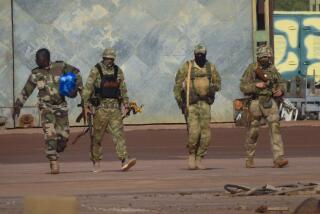Timbuktu attacks are sign of continued challenge in Mali, experts say
New attacks on the storied city of Timbuktu are a sign of the continued uneasiness in the African nation of Mali, months after French and Malian forces pushed back militants trying to extend their reach southward.
An Al Qaeda affiliate claimed responsibility Monday for the assault on Timbuktu, which started with a weekend suicide bombing on the outskirts of the city before rebel fighters moved in closer on scooters and foot, according to the Associated Press. Clashes continued Monday. Earlier this month, a suicide bomber killed a Malian soldier near the Timbuktu airport.
The attacks came two months after Timbuktu was retaken from the extremists, who had imposed harsh religious law in the city, banning music, lashing accused adulterers and chopping off hands. Analysts say the renewed violence is a sign of the militantsâ persistence after French and Malian forces routed them from northern cities.
âThese are groups that are very good at existing in the desert under very harsh conditions. Itâs hard to get rid of these kind of hit-and-run activities entirely,â said Jon Temin of the U.S. Institute of Peace. âTheyâre probably better at that sort of thing than actually holding territory.â
The Islamists have long said they want to draw the French into a lengthy war in the Sahara, said Gregory Mann, an associate professor of history at Columbia University who studies Mali. Doing battle with the French appears to have been good for recruiting new fighters into the extremist ranks.
The weekend violence underscores the uneasiness that still plagues Mali. Despite French talk of success, many Malians have not been able to return to areas they fled during the conflict, several Europeans remain hostage, and the Islamists may have recruited as many fighters as have been killed, Mann said.
Besides averting the fall of Sevare, a strategic town that had been threatened by rebel advances, âitâs hard to find a clear measure by which the intervention is a success,â Mann said.
Mali still faces obstacles on the way to stability. The frustrations of the Tuareg separatists who rebelled last year and the imbalance in power and resources between north and south have yet to be addressed, experts say. The government is still shaky in the wake of a military coup last year. Human Rights Watch has repeatedly reported allegations of torture and other abuses by Malian soldiers.
Elections are planned for July, but analysts fear a new round of polling could destabilize the country even more. With hundreds of thousands of people still displaced and election records in disarray, northerners could be severely disenfranchised, Mann said, exactly what the country should avoid as it rebuilds.
Last week, United Nations Secretary-General Ban Ki-moon warned that without reconciliation between north and south, âelections could provoke further instability or even violence.â
Whatâs tricky, Temin said, is that âsome people say you have to have elections before the government does that kind of outreach -- but itâs hard to have legitimate elections without doing that kind of outreach.â
As the French plan to pull out of Mali, Ban has proposed a new force of roughly 11,000 African troops to act as peacekeepers and suggested that a second âparallel forceâ for combat operations may be needed.
ALSO:
In Egypt, a satirist facing charges remains irreverent
Indian court ruling hailed as victory for generic drugs
North Korea, in break from bluster, elevates reformer
More to Read
Sign up for Essential California
The most important California stories and recommendations in your inbox every morning.
You may occasionally receive promotional content from the Los Angeles Times.










